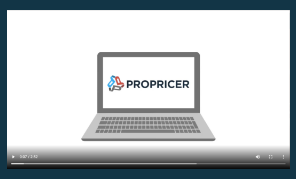Your agency continuously needs goods and services to operate for the benefit of our country’s public and warfighters. But the contract proposal process is rarely easy. It requires some involved and time-intensive stages, including identifying your exact needs (sometimes the most challenging component), soliciting bids, evaluating proposals, negotiating contracts with your resultant shortlist, and monitoring vendor performance once you choose a winner.
Still, with all it requires, the competitive bidding process is often the most cost-efficient way for an agency to do bigger business and offers many advantages over the direct procurement process—buying outright from a single-source vendor.
What are some of the benefits of competitive bidding? We’re glad you asked.
When competitive bids are your best route
- Transparency
Competitive bidding promotes fairness during the procurement process. All vendors have an equal opportunity to win government contracts based on their ability to meet the agency's requirements—no matter their size, the ethnic background of their founders, or their relationships, or lack thereof, with government officials.
Vendors who previously were excluded from government business due to a lack of connections can now compete on a level playing field. They know the evaluation criteria. They know the selection process. And they know to steer clear of anything that might even whiff of corruption.
- Cost savings
More often than not, a competitive situation helps you save agency costs by ensuring that vendors are in a constant shootout with each other to offer you their most economical terms. Simply, vendors are more likely to propose lower prices to clinch a contract. As a result, you get the best value for your money, as the competitive threshold is often successfully crossed by those who offer high-quality products at value-based prices.
- Increased efficiency
Competitive bidding promotes efficiency among vendors. Sometimes, they can only deliver quality at the lowest possible price by investing in new technologies and innovation to produce more for less. For instance, a military construction contractor may investigate 3D printing technologies to create prototypes and actual frameworks instead of crafting either by hand. Or a warfighting helmet manufacturer may explore “micro-shock” technologies within their helmets to advance a warfighter’s reflexes, shooting acumen, and flexibility rather than investing in more expensive target tracking and monitoring technologies.
The competitive bidding process also allows vendors to continuously benchmark themselves against their competitors, identify their strengths and weaknesses compared to their rivals, and consequently improve their offerings.
- Quality products or services
Winning a government contract is about delivering the highest quality at the most economical price. A competitive environment helps ensure this outcome. If the quality’s not there, a contractor risks damaging their firm’s reputation and the likelihood they’ll win future contracts. Past performance is always a consideration you, as an agency, will take into account in developing your contract shortlist and winning firm.
- Reduced risk of fraud
Competitive bidding naturally reduces the risk of fraud during a procurement, as accountability is built into the proposal process. When multiple vendors compete for a contract, collusion in the form of bribery, kickbacks, or other corruption endemic to the sole-source process is less likely to occur.
- Increased public confidence
The US public needs to be confident the Federal Government is spending its tax money judiciously and frugally. When the procurement process is transparent and fair, the public is more likely to trust the government and its practices. This trust, in turn, increases public confidence in government institutions and their ability to provide quality services to the public.
When direct procurement is most viable
While competitive bidding is generally considered to be the preferred procurement method for government agencies, there are some cases where direct procurement is more appropriate. Direct procurement involves your agency negotiating with a single vendor to purchase goods or services.
One of the main benefits of direct procurement is that it can be faster and more efficient than competitive bidding. So in cases where your agency urgently needs products, direct procurement can help you quickly secure them.
Direct procurement can also be more viable in cases where only one vendor is qualified to provide the goods or services the government needs. For example, direct procurement may be the only option if the government needs a specialized piece of equipment that is only produced by one manufacturer—such as an innovative weapon to be used exclusively during space warfare.
Finally, direct procurement can be more appropriate in cases where the cost of soliciting bids would be higher than the cost of negotiating directly with a vendor. For example, suppose the government needs to purchase a small amount of a specialized product, such as cybersecurity software seats. In that case, acquiring that software through a direct acquisition may be more cost-effective.
ProPricer smooths the proposal process
The competitive bidding process is essential in government procurement as it promotes transparency, cuts costs, boosts efficiency, guarantees quality, reduces the risk of fraud, and enhances public confidence in your agency.
When you use commercially available pricing software like ProPricer Government Edition, you’ll further support the competitive bidding process by streamlining contractor cost modeling and speeding up cost and price negotiation. Plus, a majority of contracting firms use ProPricer Contractor Edition software to submit their proposals, so you can always be on the same page during contract collaboration. Ask for a ProPricer pre-demo call today.
Government Contracting Pricing Summit 2023: Achieving Pricing Excellence During Uncertain Times
Discover the latest trends in government contracting and learn from industry leaders at the upcoming Government Contract Pricing Summit. See fascinating keynote sessions and live-panel discussions on cutting-edge contracting technologies, speed-to-contract methodologies, and more. Take advantage of this opportunity to expand your network and knowledge. Join us from June 20-22 in San Diego, CA. Register now to secure your spot.




